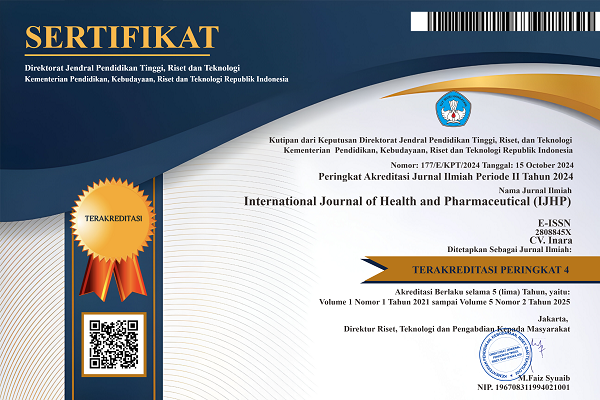Analysis Of Inpatient Medical Record Management Based On Medical Record Service Standards At Government Hospitals In Medan
DOI:
https://doi.org/10.51601/ijhp.v2i4.153Keywords:
Management, Medical Records, Hospitalization.Abstract
Inpatient medical records have an important role as a source of data and health information for inpatients related to treatment and care planning. The main factor that causes problems in inpatient medical records is the undisciplined factor of the person in charge who handles patients in filling out medical records. This can cause inpatient medical record management, not in accordance with medical record service standards. This study aimed to analyze inpatient medical record management based on medical record service standards. This research is a quantitative analytic study with a cross-sectional approach. The study was conducted at the Government Hospital in Medan. The research population was 126 people and all of them were used as samples. Sampling by means of total sampling. Data analysis used univariate, bivariate with chi-square test, and multivariate with multiple logistic regression at 95% confidence level (0.05). The results showed that inpatient medical record management implementation based on medical record service standards at the Government Hospital in Medan was influenced by work motivation (p = 0.001) and supervision (p = 0.000). While the variables that have no effect are length of work (p = 1,000), education (p = 0.848), teamwork (p = 0.241), and completeness of infrastructure (p = 0.760). The supervision variable is the most dominant variable or has the greatest influence with the value of Exp(B)/OR = 19,542. Medical record employees who state that supervision is carried out well by superiors will improve the implementation of inpatient medical record management well, compared to those who state that supervision is still not good. It is recommended that the leadership carry out inherent supervision (waskat) to all medical record employees and provide motivation through motivational seminars to improve the implementation of inpatient medical record management based on medical record service standards.
Downloads
References
Alfath, M. R. (2020). Keakuratan Berkas Rekam Medik (Studi Kasus Pada Pasien BPJS Rawat Inap Bagian Penyakit Dalam Rumah Sakit Umum Daerah Dr Pirngadi Medan Tahun 2018. 4(4), 2018–2021.
Budi, S. C. (2018). Manajemen Unit Kerja Rekam Medis (Cetakan 2). Yogyakarta: Quantum Sinergis Media.
Danim, S. (2017). Kinerja Staf dan Organisasi (Cetakan 3). Bandung: Pustaka Setia.
Ellitan, L. (2018). Peran Sumber Daya Dalam Meningkatkan Pengaruh Tehnologi Dalam Produktivitas. Surabaya: Universitas Kristen PETRA.
Ghozali, I. (2015). Aplikasi Analisis Multivariate dengan Program SPS (Cetakan 7).Semarang: Universitas Diponegoro Press.
Gunarti, R., & Muchtar, M. (2018). Rekam Medis & Informasi Kesehatan (Cetakan 1). Jakarta: Thema Publishing.
Gusnetti. (2019). Faktor-Faktor yang Mempengaruhi Kinerja Karyawan PT. Garuda Indonesia Pekanbaru. Universitas Riau.
Huffman, E. K. (2017). Health Information Management (Tenth Edit). Berwyn, Illinois: Physicians’ Record Company.
Ilyas, Y. (2020). Kinerja Teori, Penilaian dan Penelitian. Jakarta: Pusat Kajian Ekonomi Kesehatan Fakultas Kesehatan Masyarakat Universitas Indonesia.
Mathar, I. (2018). Manajemen Informasi Kesehatan. Pengelolaan Dokumen Rekam Medis. Yogyakarta: Deepublish.
Nugraheni, R. (2015).Analisis Pelayanan Rekam Medis Di Rumah Sakit X Kediri Jawa Timur Analysis Services Medical Record in Bhayangkara Hospitals Kediri-East Java. Jurnal Wiyata, 2(2), 169–175.
Permenkes RI. (2008). Peraturan Menteri Kesehatan Republik Indonesia Nomor 269/MENKES/PER/III/2008 Tentang Rekam Medis. Jakarta: Departemen Kesehatan Republik Indonesia.
Permenkes RI. (2013). Peraturan Menteri Kesehatan (Permenkes) No. 55 tahun 2013 tentang penyelenggaraan pekerjaan perekam medis. Jakarta: Kementerian Kesehatan Republik Indonesia.
Prodi ARS Unbrah. (2021). Manajemen Rekam Medis. Modul Praktikum. Banda Aceh:Prodi Administrasi Rumah Sakit, FKM Universitas Baiturrahmah.
Robbins, S. P. (2017). Perilaku Organisasi: Konsep, Kontroversi, Aplikasi. Jakarta: Prenhalindo.
Simanjuntak, E., & Shella, R. M. (2020). Tinjauan Pelaksanaan Pemeliharaan Dokumen Rekam Medis Di Ruangan Filling Rumah Sakit DR. Pirngadi Medan Tahun 2019. Jurnal Ilmiah Perekam Dan Informasi Kesehatan Imelda, 5(2), 114–120.
Wibowo. (2018). Perilaku Dalam Organisasi (Cetakan 2). Jakarta: Rajawali Press.
Wijaya, L., & Dewi, D. R. (2017). Bahan Ajar Rekam Medis Dan Informasi Kesehatan (RMIK). Manajemen Informasi Kesehatan II: Sistem Dan Sub Sistem Pelayanan RMIK. Jakarta: Pusat Pendidikan SDM Kesehatan Kementerian Kesehatan Republik Indonesia.
Downloads
Published
Issue
Section
License
Copyright (c) 2022 Muhammad Hasan Basri Nasution, Sri Wahyuni, Yolanda Eliza Putri Lubis, Ali Napiah Nasution

This work is licensed under a Creative Commons Attribution-NonCommercial 4.0 International License.























